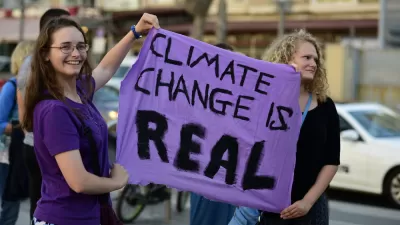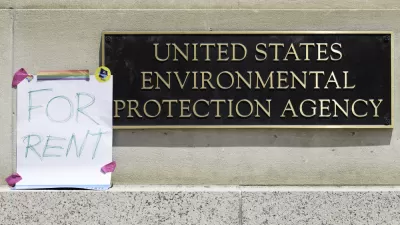A comprehensive review of the 100 largest cities in the United States shows which mayors have followed up on pledges to cut carbon emissions.

In recent years, more than ever, municipalities and state governments have pledged to take action against climate change and reduce greenhouse emissions in their jurisdictions.
"Since 1991, over 600 local governments in the United States have developed climate action plans that include greenhouse gas inventories and reduction targets, reflecting growing public concern about the consequences of a warmer planet. Recently, this local action has been accelerating. But despite numerous studies, we still don’t know if all this effort is working," writes Mark Muro.
Brookings Institution researchers explored local actions to reduce emissions and which of the nation's 100 largest cities are walking the walk when it comes to addressing climate change.
"About two-thirds of cities with climate pledges are currently lagging in their targeted emissions cuts, while 13 others don’t appear to have available emissions tracking in place," Muro reports.
Even partial adherence to climate pledges has eliminated about 365 million metric tons of carbon pollution according to Muro. Still, it's unrealistic to believe that meeting long-term goals related to climate change will be achieved without a robust and diligent review and assessment on a national scale.
If the United States reenters the Paris Climate Agreement, the burden still rests with individual cities. "[D]iplomacy won’t matter much if the rest of the world doesn’t believe our promises will stick and doesn’t see climate action in areas that have resisted thus far. The solution to this problem isn’t more diplomacy, but more mayors making (and delivering on) compelling emission reductions pledges," as Muro puts it.
FULL STORY: Cities are pledging to confront climate change, but are their actions working?

Planetizen Federal Action Tracker
A weekly monitor of how Trump’s orders and actions are impacting planners and planning in America.

San Francisco's School District Spent $105M To Build Affordable Housing for Teachers — And That's Just the Beginning
SFUSD joins a growing list of school districts using their land holdings to address housing affordability challenges faced by their own employees.

The Tiny, Adorable $7,000 Car Turning Japan Onto EVs
The single seat Mibot charges from a regular plug as quickly as an iPad, and is about half the price of an average EV.

Austin's First Single Stair Apartment Building is Officially Underway
Eliminating the requirement for two staircases in multi-story residential buildings lets developers use smaller lots and more flexible designs to create denser housing.

Atlanta Bus System Redesign Will Nearly Triple Access
MARTA's Next Gen Bus Network will retool over 100 bus routes, expand frequent service.

Toronto Condo Sales Drop 75%
In two of Canada’s most expensive cities, more condos were built than ever — and sales are plummeting.
Urban Design for Planners 1: Software Tools
This six-course series explores essential urban design concepts using open source software and equips planners with the tools they need to participate fully in the urban design process.
Planning for Universal Design
Learn the tools for implementing Universal Design in planning regulations.
Smith Gee Studio
City of Charlotte
City of Camden Redevelopment Agency
City of Astoria
Transportation Research & Education Center (TREC) at Portland State University
US High Speed Rail Association
City of Camden Redevelopment Agency
Municipality of Princeton (NJ)





























